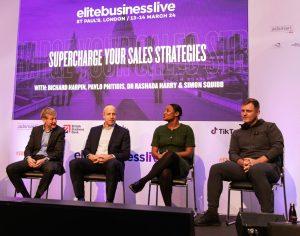Whether the recipient is a ‘friend’, ‘follower’ or ‘connection’, pinging 140-character messages to friends, colleagues or potential clients is pretty much the norm in today’s society. Over a billion tweets are sent every three days, giving businesses insight into what’s trending now and who their customers are following. When hiring, most businesses will use social media sites to screen candidates; an applicant who knows their tumblr from their Twitter, and their Facebook from their Flickr will definitely get a big tick in these PR-conscious times.
Linda Cheung has always been interested in how businesses and markets interact and communicate with one another. Hardly lacking in early influences, Cheung’s entrepreneurial stirrings began as a child as she watched her father run his own business. Perhaps inevitably, she was drawn to the City; for someone interested in global interaction, there could be few places quite so attractive, particularly given the increasing role, technologies such as email and the internet were beginning to play in the country’s financial and business capital.
Leaving the London School of Economics with an MSc in economics, Cheung started her career at tax and advisory services firm KPMG – a graduate role that was to be of pivotal importance to the formation of CubeSocial. Encouraging enterprises to make the most of the technological solutions at their disposal has been something of a recurring theme in Cheung’s life: she recalls having a fight on her hands when she wanted to adopt email, with senior members firmly believing the trend would never catch on.
For the next 13 years, Cheung called the Morgan Stanley offices her second home. The position gave her plenty of opportunities to flex her entrepreneurial muscles – for example, acting as a key player in the launch of the company’s first ever credit card. However, despite climbing the corporate ladder and securing a chief operating officer title at just 32 years old, Cheung was clearly a chip off the old block. Following in her father’s footsteps, she traded in her suit for jeans and her plush St John’s Wood flat for life in Basingstoke – dubbed jokingly ‘Amazingstoke’ by the entrepreneur – and returned to the grass roots, joining forces with social software veteran and an ex-Microsoft employee Mark Bower. And so CubeSocial was born.
A core question for any company providing services to businesses is, ‘What do businesses want?’ After extensive research, Cheung and Bower found that the most important concern for businesses was finding new ways to reach and secure new customers. Together, the two entrepreneurs decided to devise a social CRM for professionals aimed at enabling the user to easily manage their contacts, tasks and social media conversations to win business through social media. “When we started talking about the business, I realised how much of a geek I really was,” she says. “I love technology for what it can do, which makes me the business element of our business relationship. Mark is much more about loving technology and seeing how it progresses things along in the world.”

In a nutshell, as Microsoft Outlook has become synonymous with email and calendar management, CubeSocial is the professional one-stop-shop for social media. It allows enterprises to turn email contacts into social profiles, meaning businesses can see, in one simple view, which social media sites their contacts are using. This enables companies to approach their customers through the channels they are using, as well as posting updates to multiple social media accounts in a single click. CubeSocial also offers a hype-free social media consulting service to get you started with social media; from complete outsourcing of social media activity through to training, strategic planning and support.
For some, the social-media sector is still rather intimidating and it’s easy to assume social-media entrepreneurs like Cheung must have had extensive pre-existing knowledge to make such an impact in the social space. But with refreshing frankness, Cheung admits that when she left Morgan Stanley she was a complete social-media novice; she had less than a dozen connections on LinkedIn and had never once opened a Facebook or Twitter account. All of her experience in the sector is very much self-taught – for a long time she simply watched how it was done, a process she calls ‘lurking and learning’, before creating her own profiles.
It was, in fact, Jonathon Ross who was part of her business education in the start-up world. “He was one of the celebrities I followed,” Cheung explains. “It quickly occurred to me how significant [social media] could be and how it was just another way to talk.” A useful insight came from watching the way Ross used social interaction to drive word-of-mouth around his shows. He would tweet about who he’d be interviewing on the show the day before it was filmed, giving his followers product teasers, creating potential advocacy for that person and seeding follower interaction by encouraging them to take part in the discussion.
Starting up in the recession was not a hindrance to the pair, in part down to some shrewd planning. Rather than adopting the ‘London or bust’ mentality so often adopted by UK tech, the duo based the privately funded company in Basingstoke, keeping costs down without sacrificing easy access to all the benefits the capital offered. “When you’re a start-up, the best thing is to keep things as lean as possible,” she explains. “In a smaller location, there is more ability to build a local presence and grow, getting coverage that then gets picked up elsewhere.”
But how has CubeSocial built such a high profile in a very competitive space? For Cheung, business practice has always been about building great relationships, which can only come about through conversation. She feels social media’s greatest strength lies in how it aids companies in interacting with their customer base and build relationships. A phrase Cheung can commonly be heard using and CubeSocial’s hashtag of choice is ‘joining the dots’. “It’s always about those connections, about joining the dots,” she explains. “Big business is about how you connect – and to whom.”
Cheung draws on the analogy of Twitter being the ‘virtual cocktail party’. Twitter is about mingling; it enables you to join a conversation uninhibited as long as you have something relevant to say – even if you don’t know the people involved.

“That makes Twitter in particular, very powerful from a B2B perspective,” she adds. On a similar level, Cheung often refers to Facebook as the virtual house party, which is invite-only, and LinkedIn as the virtual shop front where, if a business potential likes what they see on your profile, they will be encouraged to explore what more is on offer and ‘get connected’. But all of these opportunities are primarily social in nature – without being proactive and gregarious, actively seeking connections, you’re going to be spending a lot of lonely evenings by yourself.
And CubeSocial has definitely practiced what it preaches, promoting itself to great effect through social media alone. “To date, we have gained local, national and international press coverage as well as a 45-minute interview on BBC radio, all without spending a penny on marketing or PR,” Cheung explains. Pretty impressive stuff, particularly given the nature of the attention being paid to the outfit. It has been named as a Top 20 Idea in The Guardian, was listed as a ‘One to Watch’ by analyst firm Index B and was chosen as a finalist in the 2012 Cloud Computing World Series Awards in the Best Social CRM category.
Even though CubeSocial is a mere slip of a thing at two years old, Cheung has grand ambitions for the company. Because it’s built around one of the most prevalent needs on the market, a requirement to establish effective connections, its place in the market is pretty much guaranteed. Not only that, but given the rapidly changing nature of the social space, there’s never been a more exciting time for the CubeSocial team. “To create a product or a business that could change the way thousands or millions of professionals do business is extremely exciting for me,” says Cheung. “The fact that we may play a part in that is phenomenal.” ![]()
Share via:


















































